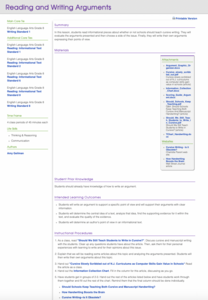National Endowment for the Humanities
The Argument of the Declaration of Independence
When in the course of a course on historic American events, it becomes necessary for learners to examine, with decent respect, the Declaration of Independence, it becomes evident that there are six separate and equal parts of that...
Clever Student Training Company
Eliminating Weak Essay Material
A strong essay eliminates weak or unnecessary material. Determining what information contributes to an essay and what information should be deleted is a skill readers and writers of informational text must develop. Class members practice...
Clever Student Training Company
Logical Fallacies Recognition
“Should same-sex marriage be allowed?” As part of a study of recognizing logical fallacies learners read John Stemberger’s April 12, 2012 argument against same-sex marriage published on the opinion page of the Orlando Sentinel. They then...
Curated OER
Reading and Writing Arguments
Should schools continue to teach cursive writing? After reading and considering the merits of a series of arguments on both sides of this proposition, class members choose a side of the issue and craft their own argument, drawing support...
Curated OER
Charles Darwin Meets John Paul II
If you teach AP English language and composition and are looking for a way to address the differences between written and spoken arguments, consider this lesson. Over the course of three days, class members research Charles Darwin or...
Other
In Time: Tenets of Democracy: Critical Thinking and Decision Making
This critical thinking exercise and checklist is designed for teachers and students. A lesson plan can be developed here that illustrates decision-making skills and a teacher can use examples of common problems that get in the way when...







